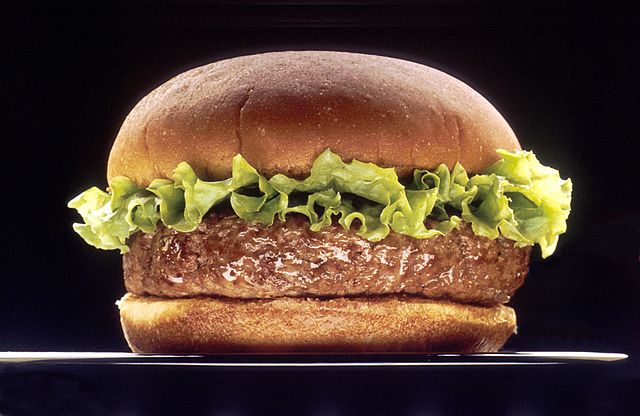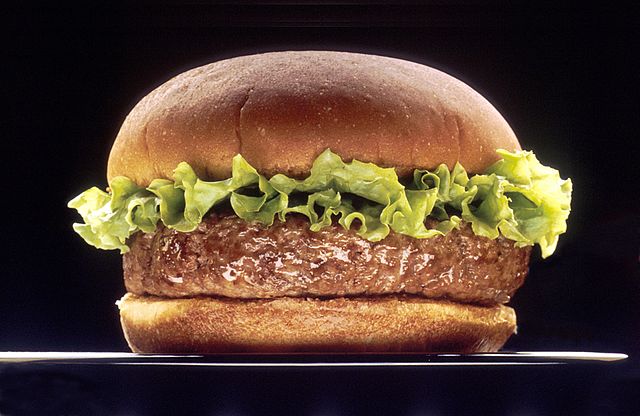This post is also available in Dutch .
Worldwide, overweight and obesity are related to more deaths than starvation. Food addiction is often shown to lead to obesity, but how does that compare to drug addiction?

Image by Len Rizzi (photographer, original image), reprocessed by Off-shell – File:NCI Visuals Food Hamburger.jpg, Public Domain.
Obesity has nearly tripled worldwide since 1975. The World Health Organisation reported that in 2016 globally, 1.9 billion adults, 18 years and older, were overweight, and 650 million were obese. In overweight and obesity, individuals suffer from excessive fat with serious health issues. In the last years, it was increasingly discussed whether food addiction (an intense and persistent desire or “craving” to consume food) could be the main cause for obesity. Research supports the view that obesity resulting from food addiction strongly resembles a drug addiction in the brain as well as on the behavioral level.
Where food addiction resembles a drug addiction
Certain foods (high in fat, salt, and sugar) seem to have addictive properties. They activate brain regions, including the brain’s reward system, in a similar way to ‘conventional’ addictive substances such as drugs and alcohol. These brain activations are associated with the loss of control, such as struggling to regulate food and/or drug intake.
Moreover, there are some symptom criteria for substance dependence classified in the DSM-IV criteria (Diagnostic and Statistical Manual of Mental Disorders IV, the diagnostics books of psychiatry) that parallel behaviors in food addiction. For example, tolerance is an important criterion for drug addiction. Tolerance arises when your body begins to adjust to the ‘drug,’ and you need to use an increasing amount of the drug to reach intoxication. A similar condition can be related to food addiction where increasing amounts of food are required to reach satiety.
Another similarity between food and drug addiction is a persistent desire to cut food or drug intake with unsuccessful attempts. Substance use and overeating is often continued even though the individual knows that the drug or food is causing physical or mental problems. (Although many DSM-IV criteria of substance abuse parallel a ‘food addiction,’ it is important to recognize that not all of them do.)
Scientific investigations demonstrated a similar genetic link between obesity and drug addiction. For example, a family history of alcoholism has been shown to be related with an increased risk of obesity. Binge eating disorder is linked with increased levels of substance use disorder in relatives.
Important differences between food and drug addiction
There are important differences between food and drug addictions that should be recognized as well. The societal impact of overeating is much bigger than that of drugs of abuse (this holds to a lesser extent for alcohol). Availability is a major factor: food advertising is all around us, and food stores are abundant at every corner (an interesting documentary on this is ‘Supersize me’). And since unhealthy food items are often cheaper than healthy alternatives, a lower social economic status can favor obesogenic food choices. This factor in food addiction is quite different from the situation with drug addiction.
The resemblance of a food- and a drug addiction may explain why some overweight or obese individuals struggle to lose weight. If research on this topic continues, certain interventions like behavioral and/or drug therapy may help improve the treatment of food addiction.
Written by Mahur. Edited by Annelies.
